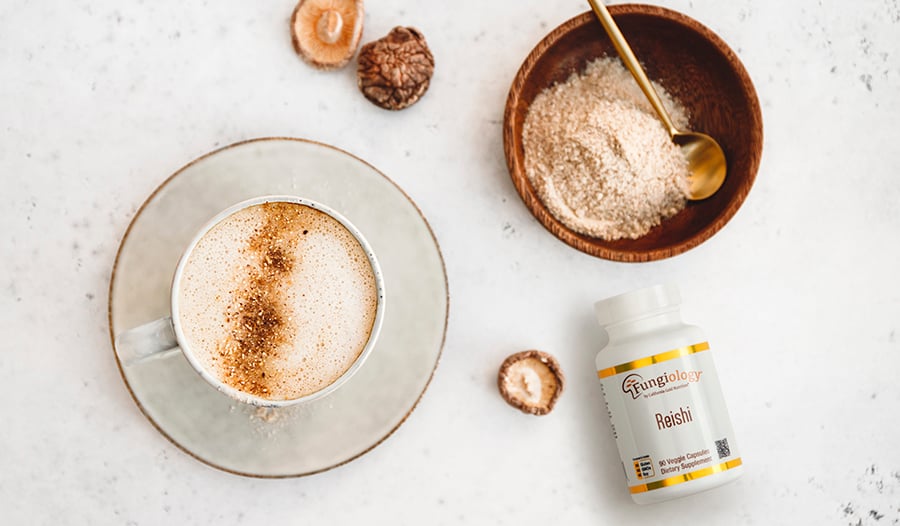Suplimente de ciuperci: starea de spirit, concentrarea, sănătatea imună și mai multe beneficii

Suplimentele de ciuperci au fost la modă în ultimii ani. Utilizarea ciupercilor medicinale datează din vechile cărți medicale chinezești și medicina tibetană de acum mii de ani. Deși utilizarea ciupercilor în moduri medicinale există de atât de mult timp, utilizarea lor devine obișnuită în vest.
Ciupercile sunt o dietă sănătoasă de bază
Ciupercile care sunt cumpărate în mod obișnuit în magazinele alimentare, cum ar fi portobello, shiitake, buton și ciupercile albe se încadrează în aceeași categorie. Sunt ciuperci din punct de vedere tehnic, dar în scopuri de gătit, ciupercile sunt clasificate ca legume. Consumul de ciuperci oferă organismului o sursă excelentă de fibre, vitamine și minerale. Unul dintre cele mai notabile beneficii nutriționale ale ciupercilor este numărul de antioxidanți și fibra solubilă beta-glucan, care s-a dovedit a îmbunătăți sănătatea inimii.
Care sunt beneficiile suplimentelor de ciuperci?
Ciupercile folosite în gătit sunt cultivate și produse în același mod ca și cele găsite în suplimente. Diferența dintre cele două este că ciupercile care sunt utilizate în suplimente sunt considerate a avea mai multe beneficii pentru sănătate. Aceste beneficii le clasifică drept alimente funcționale, ceea ce înseamnă că oferă mai mult decât beneficii nutriționale. Mai mult de 100 de funcții medicinale sunt produse de ciuperci.
Principalele beneficii ale suplimentelor de ciuperci sunt proprietățile lor antioxidante, protecția cardiovasculară, proprietățile antibacteriene și proprietățile antiinflamatorii. Cercetările clinice privind beneficiile pentru sănătate ale ciupercilor sunt limitate și sunt necesare mai multe cercetări. Cu toate acestea, știm că consumul de ciuperci este cunoscut a fi sigur și nu dăunează sănătății generale.
Un alt termen pe care îl puteți auzi sau vedea, de asemenea, referitor la produsele din ciuperci este adaptogeni. Adaptogenii sunt ierburi și ciuperci care ajută la contracararea stresului pe care îl suferă corpul tău. Glandele hipofizare și suprarenale sunt implicate în răspunsul la stres, iar adaptogenii pot ajuta la reglarea unui echilibru stabil în organism. Adaptogenii sunt un alt beneficiu funcțional al suplimentării cu ciuperci.
5 Tipuri de ciuperci şi beneficiile lor pentru sănătate
Suplimentele de ciuperci sunt făcute prin uscarea ciupercilor crude și extragerea lor cu apă fierbinte. După aceasta, acestea sunt apoi transformate într-o pulbere fină, ca produsele pe care le vedem în magazine. Atunci când achiziționați suplimente de ciuperci, este important să rețineți că acestea nu sunt reglementate de Administrația SUA pentru Alimente și Medicamente și să cumpărați numai din surse de încredere.
Când faceți suplimente, se pot folosi o varietate de ciuperci pe baza proprietăților medicinale pe care le dețin. Ciupercile care sunt folosite în suplimente cel mai des sunt reishi, coama leului, chaga, cordycepsși coadă de curcan. Există multe alte soiuri de ciuperci care există, dar acestea sunt cele mai frecvent întâlnite în suplimente. Datorită numărului de soiuri disponibile, poate fi greu de diferențiat care au proprietăți funcționale și când să le folosiți.
Ciuperci Reishi
Ciupercile Reishi sunt cunoscute științific sub numele de Ganoderma lucidum și pot fi, de asemenea, numite lingzhi. În chineză, cuvântul lingzhi simbolizează puterea divină și longevitatea, prin urmare, se crede că această varietate de ciuperci este legată de longevitate. Gustul ciupercilor reishi este amar și dur în textură. Ciupercile Reishi pot fi găsite crescând pe copaci de foioase.
Ciupercile Reishi sunt utilizate cel mai frecvent pentru a stimula sistemul imunitar și, eventual, pentru a ajuta la lupta împotriva radicalilor liberi din organism. Se crede că beta-glucanii din reishi stimulează sistemul imunitar, dându-le posibil acest efect. Ceea ce face această ciupercă unică sunt proprietățile sale calmante din triterpenă care pot stimula starea de spirit, reduce anxietatea, ușura depresia și chiar îmbunătățesc somnul.
Cercetările la om sunt limitate, dar sunt în curs de desfășurare pentru a determina beneficiile potențiale ale ciupercilor reishi.
Coama Leului
Ciupercile cu coama de lei sunt una dintre cele mai amuzante ciuperci cu aspect. Sunt ciuperci albe mari, care au mulți spini albi lungi, care seamănă cu coama unui leu. De obicei, acestea sunt cultivate pe lemn de esență tare mort și în descompunere sau pot fi cultivate într-un substrat acasă.
La fel ca majoritatea ciupercilor, coama leului conține, de asemenea, o cantitate bună de antioxidanți care pot menține celulele sănătoase. Claritatea mentală este unul dintre cele mai atrăgătoare efecte. Unele studii au descoperit că coama leului are compuși care pot stimula creșterea celulelor creierului. Acest lucru poate ajuta nu numai la memorie, dar poate sprijini și răspunsurile emoționale și anxietatea și depresia.
Pentru a vă aminti cu ușurință ce face coama leului, încercați să asociați o coamă de leu care este pe cap cu creierul care se află în interiorul capului.
Chaga
Ciupercile Chaga se găsesc adesea crescând pe mesteacăn în climă mai rece. Deși aspectul ciupercilor Chaga pare a fi o grămadă arsă de scoarță de copac, ele au proprietăți funcționale. În mod tradițional, Chaga a fost măcinată și folosită în ceaiurile din plante, dar acum poate fi găsită în alte forme de supliment.
S-a demonstrat că Chaga reduce inflamația și stresul oxidativ din organism, ceea ce poate ajuta la reducerea semnelor fizice ale îmbătrânirii organismului.
Înainte de a încerca ciupercile Chaga, trebuie discutat cu medicul dumneavoastră primar sau cu dieteticianul. Spre deosebire de alte soiuri de ciuperci, Chaga are o proteină care poate afecta coagularea sângelui. Ciupercile Chaga sunt, de asemenea, bogate în oxalați, despre care se știe că cresc probabilitatea apariției pietrelor la rinichi.
Coada de curcan
Coada de curcan, în ciuda numelui său, nu conține curcani. Acest nume a fost ales deoarece ciuperca însăși seamănă cu o coadă de curcan și are culori strălucitoare. Acestea pot fi găsite crescând pe trunchiurile copacilor din zonele împădurite.
Coada de curcan este cea mai populară datorită proprietăților sale de stimulare a imunității și antioxidante și pentru că poate avea compuși care pot stimula și întări sistemul imunitar.
Cordyceps
Cordyceps cuprinde mai mult de 400 de specii, dar două tipuri sunt cel mai adesea cercetate și utilizate în suplimente.
Cea mai obișnuită utilizare a acestora este pentru creșterea energiei, deoarece cresc producția unei molecule care ajută la aducerea energiei mușchilor. În mod tradițional, cordycepsul a fost folosit pentru a reduce oboseala și pentru a spori forța și apetitul sexual. La fel ca multe alte ciuperci funcționale, ele pot încetini îmbătrânirea.
Datorită dificultății de recoltare a cordycepsului, versiunile sintetice sunt utilizate în mod obișnuit.
Cafea cu ciuperci, ceai şi cacao
Cafeaua cu ciuperci este una dintre cele mai comune metode de a suplimenta cu ciuperci și este o alternativă excelentă pe bază de plante la cafeaua tradițională . Poate fi numită și cafea Ganodermași vine adesea în pachete care conțin extract de ciuperci și cafea instant. Fiecare pachet este adăugat la apă fierbinte și amestecat pentru a crea cafea cu ciuperci. Același proces este valabil și pentru ceai și cacao fierbinte, pachetul premăsurat fiind adăugat în apă. Deși cafeaua cu ciuperci dimineața sună fantezist, este într-adevăr doar o cafea neagră obișnuită amestecată cu unul sau mai multe dintre extractele funcționale de ciuperci.
Ciupercile folosite în cafeaua cu ciuperci sunt uscate și extrase pentru a scoate compușii benefici și apoi sunt amestecate cu cafea obișnuită. De cele mai multe ori cafeaua cu ciuperci este mai mică în cofeină decât cafeaua obișnuită, ceea ce poate fi mai benefic pentru unii utilizatori. Chiar și în cazul cafelei cu ciuperci, se aplică aceleași idei de limitare a cantității de zahăr, cremă și alte suplimente de cafea utilizate.
Sfat profesionist: Încercați să adăugați câte un soi la un moment dat
Când adăugați orice tip de suplimente de ciuperci în dieta dvs., încercați să adăugați câte o varietate la un moment dat, astfel încât să puteți urmări beneficiile pe care le puteți avea. Amintiți-vă că, înainte de a începe un nou supliment, inclusiv ciuperci, consultați furnizorul medical pentru a vă asigura siguranța, mai ales dacă există condiții preexistente.
Ciuperci pentru imunitate și sănătatea întregului corp: Citiți mai multe.
Referințe:
- Panda, AK și Swain, KC (2011). Utilizări tradiționale și potențialul medicinal al Cordyceps sinensis din Sikkim. Jurnalul de Ayurveda și medicină integrativă, 2 (1), 9—13. https://doi.org/10.4103/0975-9476.78183
- Valverde, M.E., Hernández-Pérez, T. și Paredes-López, O. (2015). Ciuperci comestibile: îmbunătățirea sănătății umane și promovarea vieții de calitate. Revista internațională de microbiologie, 2015, 376387. https://doi.org/10.1155/2015/376387
- Wachtel-Galor S, Yuen J, Buswell JA și colab. Ganoderma lucidum (Lingzhi sau Reishi): O ciupercă medicinală. În: Benzie IFF, Wachtel-Galor S, editori. Medicina pe bază de plante: aspecte biomoleculare și clinice. Ediția a II-a. Boca Raton (FL): Presa CRC/Taylor & Francis; 2011. Capitolul 9. Disponibil de la: https://www.ncbi.nlm.nih.gov/books/NBK92757/
- Lin ZB. Mecanisme celulare și moleculare de imuno-modulare de către Ganoderma lucidum. J Pharmacol Sci. 2005 octombrie; 99 (2): 144-53. doi: 10.1254/jphs.crj05008x. NUMĂR: 16230843.
- Wang SY, Hsu ML, Hsu HC și colab. Efectul antitumoral al Ganoderma lucidum este mediat de citokinele eliberate din macrofagele activate și limfocitele T. Int J Cancer. 1997; 70 (6): 699-705.
- Matsuzaki, H., Shimizu, Y., Iwata, N. și colab. Efecte asemănătoare antidepresivelor ale unui extract solubil în apă din mediul de cultură al miceliei Ganoderma lucidum la șobolani. Complementul BMC Altern Med 13, 370 (2013). https://doi.org/10.1186/1472-6882-13-370
- Cui XY, Cui SY, Zhang J, Wang ZJ, Yu B, Sheng ZF, Zhang XQ, Zhang YH. Extractul de Ganoderma lucidum prelungește timpul de somn la șobolani. J Ethnopharmacol. 2012 15 februarie; 139 (3): 796-800. doi: 10.1016/j.jep.2011.12.020. Epub 2011 21 decembrie. DIMENSIUNEA: 22207209.
- Lai PL, Naidu M, Sabaratnam V, Wong KH, David RP, Kuppusamy UR, Abdullah N, Malek SN. Proprietăți neurotrofice ale ciupercii medicinale cu coama leului, Hericium erinaceus (Basidiomycetes superior) din Malaezia. Ciuperci Int J Med. 2013; 15 (6): 539-54. doi: 10.1615/intjmedmushr.v15.i6.30. NUMĂR: 24266378.
- Hyun KW, Jeong SC, Lee DH, Park JS, Lee JS. Izolarea și caracterizarea unei noi peptide inhibitoare a agregării plachetare din ciuperca medicinală, Inonotus obliquus. Peptide. 2006 iunie; 27 (6): 1173-8. doi: 10.1016/j.peptides.2005.10.005. Epub 2005 11 noiembrie. NUMĂR: 16289471.
- Lee, S., Lee, HY, Park, Y., Ko, EJ, Ban, TH, Chung, B.H., Lee, HS și Yang, KW (2020). Dezvoltarea bolii renale în stadiu final după ingestia pe termen lung a ciupercii Chaga: raport de caz și revizuirea literaturii. Jurnalul științei medicale coreene, 35 (19), e122. https://doi.org/10.3346/jkms.2020.35.e122
- Hsieh TC., Chao H.H., Chu Y., Doonan BB, Wu JM (2019) Extracte apoase și etanolice de ciuperci medicinale Trametes versicolor interacționează cu ADN-ul: un nou efect genoactiv care contribuie la activitatea sa antiproliferativă în celulele canceroase. În: Agrawal D., Dhanasekaran M. (eds) Ciuperci medicinale. Springer, Singapore. https://doi.org/10.1007/978-981-13-6382-5_7
- Xu YF. Efectul polizaharidei din Cordyceps militaris (Ascomycetes) asupra oboselii fizice induse de înotul forțat. Ciuperci Int J Med. 2016; 18 (12): 1083-1092. doi: 10.1615/IntjmedMushrooms.v18.i12.30. NUMĂR: 28094746.
Declarație de declinare a responsabilității:Acest blog nu are ca scop să ofere un diagnostic.
















































































 Cuprins
Cuprins
















